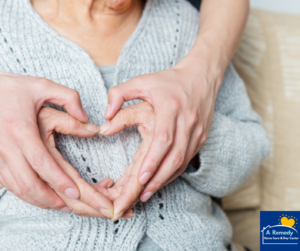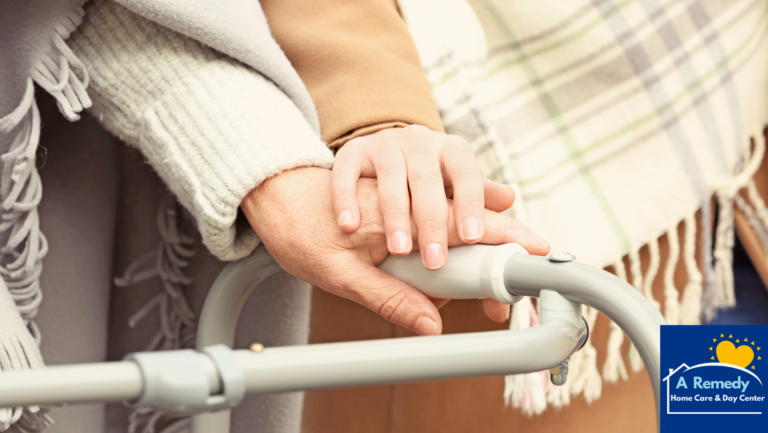What is Parkinson’s Disease?
Parkinson’s disease is a nervous system disorder of the brain that affects movement. Symptoms may include tremors, change in the pace of movement, stiffness, and loss of balance. The cause of the disease is unknown and there is no cure. Medical science has come up with treatments that may control symptoms, but the patient you’re caring for may need your help keeping up with them.
As a caregiver, you are witness to what your loved one is going through, which puts you in a position to make a tremendous contribution to their Parkinson’s disease treatment.

How Does Parkinson’s Disease In-Home Care or Adult Day Center help Help?
The Parkinson’s disease process presents a set of problems unto itself. At A Remedy Home Care and Adult Day Center, we are proactive in educating our staff to monitor for potential issues involving this disease process. Recognizing that Parkinson’s disease can mean a person is living not only with mobility issues but will often have emotional, social, and psychological needs. Supported by our registered nurse, our caregivers offer a wide range of services from personal care, outings/appointments, respite care, and housekeeping, to 24-hour care.
Alterations in gait can present many fall hazards. Our staff is trained to recognize potential risks and take preventive measures like having your loved one wear non-skid footwear and well-fitting clothing. They will also point out the need for adaptive equipment to promote independence with feeding and close monitoring for swallowing issues.
Becoming a caregiver to someone with Parkinson’s typically means attending doctor appointments and therapy sessions, administering medication, and performing household duties or any activity that’s more difficult to perform because of the disease.
Being a caregiver can be a complicated and physically and emotionally draining experience. Providing Parkinson’s care for an aging loved one with safety and quality of life in mind presents challenges as the disease progresses and has an impact on your loved one’s physical, emotional, and cognitive health.
Get started today with one of our dedicated staff and see what services A Remedy Home Care and Day Center can provide to your loved ones.

Adult Day Care Center for Parkinson's Disease
A Remedy Adult Day Center is beneficial for individuals who are living at home with a caregiver. Our Adult Day Center form of care may be used by caregivers who need to work outside the home or when they need to run errands, attend appointments, or simply need to have a respite break from caregiving.
We will provide meals, activities, and some limited medical services. Our program offers relief to family members and caregivers, allowing them to go to work, handle personal business, or just relax while knowing their relative is well cared for and safe. Day Centers are affordable options for many families.
Providing exceptional Parkinson’s Disease Home Care and Adult Day Care Center for seniors and families in all of Spartanburg County and surrounding areas including Arcadia, Boiling Springs, Campobello, Duncan, Glendale, Inman, Landrum, Lyman, Moore, Pacolet, Reidville, Roebuck, City of Spartanburg, Startex, Wellford, Woodruff, and surrounding areas.
What Does Parkinson’s Disease Home Care Include?
People with Parkinson’s disease rely on caregivers for a wide range of support. As the disease progresses, dependence on a caregiver increases substantially. Caregivers can help people with Parkinson’s adjust to the disease’s effects on the body and knowing that a loved one cares for them can help the entire family adjust to the diagnosis.
For this reason, hiring a professional caregiver is the right solution for many families, but most importantly, entrusting the care of your loved one to someone else is not always an easy task. That’s where we at A Remedy Home Care come in. Our highly qualified and compassionate caregivers meet the needs of seniors with Parkinson’s by restoring and maintaining comfort, health, and freedom through our comprehensive care services and hourly care schedules.
At A Remedy Home Care, we know how difficult a challenge it is to care for a loved one with Parkinson’s disease. Our job is to help take the burden off you, as our highly specialized team of caregivers and nurses are here to help. We become an integral part of your loved one’s experience by offering to help share the responsibilities associated with the disease, including doctor appointments, therapy sessions, medication administration, and household duties.
Other components of our Parkinson’s care plan may include, but are not limited to:
- Scheduling and transportation for medical appointments
- Communicating with the senior’s physical, occupational, and speech therapists
- Preparing nutritious meals per abilities and feeding
- Offering companionship and emotional support to reduce instances of depression
Companion Care at Home for Parkinson’s Disease
Companion care can be an invaluable resource for seniors who have difficulty performing basic tasks or activities at home. Whether it’s helping around the house by doing laundry, grocery shopping, making meals, or taking a walk outside—at A Remedy Home Care we’re always available to step in whenever needed during tough times so that our client can maintain their independence as long as possible.
With companion care at home, aging adults can keep their routines and continue to live independently in their own homes.
If you’re looking for a caregiver to help with everyday tasks like cooking, cleaning, and running errands but do not need the extra care that comes with an elderly loved one who might be bedridden or incontinent, companion caregiving is your best bet.
What Is Companion Care?

It has been estimated that there are more than 18 million people in the US that need some form of assistance with their daily activities.
This is increasing as our population continues to age and new generations grow up expecting a high standard of living even if they no longer work outside the home, among other factors.
Companion care services offer essential help for those who can’t get around on their own without aid or struggle after long periods sitting down because it provides them companionship when needed – this helps give family caregivers peace of mind knowing someone will be checking up on them throughout the day.
Caregivers help to make daily living easier and safer for the care recipients. Some of these ways are performing errands, like grocery shopping or picking up medications, on their behalf; other times they will plan and prepare regular meals as well as light housekeeping duties. Caregiver’s often perform medication reminders too!
Caregivers are there to improve quality of life in other ways. They act as partners for favorite hobbies and activities, accompany clients on appointments and outings, or engage in friendly conversations with their loved ones.
Companion caregiving provides isolated seniors with social interaction and regular companionship, ending the cycle of senior isolation which can lead to health complications.
Benefits of In-Home Companion Care for Parkinson’s Disease
Supporting Seniors Emotionally
Seniors are more comfortable sharing their emotions with non-family members than they are discussing them with the closest family. Seniors don’t want to burden adult children or close relatives, but companions can help seniors open up and talk about what’s bothering them. Companions also know strategies for drawing out a conversation to teach healthy coping skills after establishing rapport.
Preventative Care for Seniors
Caregivers have a very important role in the lives of seniors. They are not just there for social and emotional support, but also to help with preventive care issues such as nutrition or exercise that can lead to malnutrition. This is an issue common among senior citizens which could result in various health conditions later on down the road if it’s left untreated for too long.
In addition to meal planning and preparation, companion caregivers can help seniors with their daily exercise. For example, they could escort them on walks so that they maintain mobility and endurance as well as monitor the aging adult’s health. Companion care also enables older adults to remain safe in their homes while still being independent.
We have the capabilities to meet almost any in-home care service request. Click here to learn more about our services.
Respite care for family caregivers
Caring for a family member can be hard, especially when it seems like there’s never enough time in the day. Respite care allows, older adults and people with illnesses or disabilities to get the attention and support they need while also providing primary caretakers with a much-needed break, or respite. Caregivers sometimes need to take some time off from the constant care tasks and find themselves overwhelmed with stress. This burnout is dangerous because if not taken seriously by taking needed breaks from caregiving duties, this fatigue could lead to depression and anxiety.
In conclusion, companion care provides respite relief in times of caregiver burnout; allowing families much-needed rest while their loved one receives professional support during these stressful periods.
What is the difference between Companion Care and Personal Care?
When you need home care for your aging loved one, it can be challenging deciding what type of service will work best. Companion Care services tend to focus on social needs while personal-care services focuses physical needs.
When choosing elder care, the difference between companion and personal is an important consideration in the decision process as they both provide different benefits based on a person’s individualized requirements.
Companion Care
The goal of companion care is primarily focuses on company, emotional support and socialization, although companions may help older adults with a variety of tasks. Home care companions can do your laundry, prepare meals, and help out with errands like grocery shopping. They also provide emotional support to those who are grieving or struggling in their day-to-day lives due to illness or disability.
Busy family members enjoy peace of mind knowing their loved one has regular social interaction and someone to help at home.
Personal Care
Personal care is an area of service that seeks to help people with basic needs, like personal hygiene. It can also provide physical assistance in the form of helping a person get up from their seat, grooming, eat, get dressed, and go to the bathroom.
Many older adults can age in place with the help of companion caregiving. However, seniors who require advanced care or physical assistance may need personal care to live at home safely.
For more information about understanding Parkinson’s disease visit the Parkinson’s foundation.
